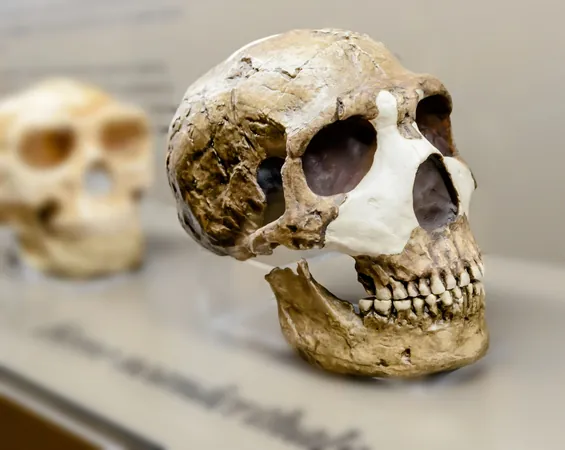
Is Your Headache Linked to Neanderthal Genes? Surprising New Research Reveals Shocking Connection!
2025-07-07
Author: Emma
Have you ever felt a pulsating headache that makes it seem like your brain is battling for space? Recent research indicates that this discomfort might have roots tracing back to our ancient relatives, the Neanderthals. Yes, you heard that right!
Unraveling Chiari Malformation Type 1
A groundbreaking study led by Kimberly Plomp from the University of the Philippines Diliman, in collaboration with neurosurgeon Yvens Barbosa Fernandes from Brazil, investigates Chiari malformation type 1. This condition occurs when the lower part of the brain, known as the cerebellum, droops through a crucial opening at the base of the skull.
Previous diagnoses of Chiari have been challenging due to its unclear origins, affecting roughly 1 in every 100 Americans. Yet, this new study sheds light on the anatomical reasons behind this malformation.
How Neanderthal Skull Shapes Squeeze Our Brains
Using advanced modeling techniques, Plomp's team examined the skulls of 46 patients with Chiari malformation and 57 unaffected individuals. They discovered a significant correlation between Chiari patients' skull shapes and those of Neanderthals, revealing that a smaller and flatter occipital bone reduces the cranial space necessary for the modern human brain.
As Barbosa Fernandes points out, 'If you have less angulation, you have less space for the modern human brain.' This insight highlights how characteristics we inherited from Neanderthals might contribute negatively to our health.
Symptoms and Silent Struggles
For many, headaches are just an annoyance, but those suffering from Chiari often face debilitating pain triggered by coughing, straining, or even laughter. Additional symptoms range from neck pain to tingling limbs, and surprisingly, some individuals may remain symptom-free for years.
Echoes of Our Ancients: A Genetic Connection?
Further investigation into the genetic makeup of Chiari patients is underway. Plomp's team plans to conduct full-genome scans to identify 'introgressed' Neanderthal DNA that may affect skull geometry and health. This ongoing research reveals that while most Neanderthal DNA is harmless, specific genetic bits could significantly impact modern human life.
Implications for the Future: Prenatal Screening?
As researchers make strides in uncovering the implications of Neanderthal genes on human health, the potential for early intervention and screening becomes increasingly exciting. If particular skull-shaping genes are identified, clinicians may be able to flag at-risk families well before symptoms manifest.
A Glimpse into Evolutionary Trade-offs
This study emphasizes how traits developed for survival in harsh conditions can lead to modern challenges. The Neanderthal skull, optimized for an icy existence, creates complications for today’s humans who often spend extended periods hunched over screens.
The researchers hope that by mapping these findings to living genomes, they can predict which individuals may require surgical intervention due to their inherited Neanderthal traits. Public health officials could even estimate regional instances of Chiari malformation, dramatically altering the landscape of neurological care.
As we continue to unearth these ancient connections to our modern ailments, one thing is clear: understanding our evolutionary history may empower us in addressing contemporary health issues.
For those intrigued by the implications of this research, they're encouraged to stay updated with the findings as they unfold, further showcasing how our link to Neanderthals may influence our health in unexpected ways.









 Brasil (PT)
Brasil (PT)
 Canada (EN)
Canada (EN)
 Chile (ES)
Chile (ES)
 Česko (CS)
Česko (CS)
 대한민국 (KO)
대한민국 (KO)
 España (ES)
España (ES)
 France (FR)
France (FR)
 Hong Kong (EN)
Hong Kong (EN)
 Italia (IT)
Italia (IT)
 日本 (JA)
日本 (JA)
 Magyarország (HU)
Magyarország (HU)
 Norge (NO)
Norge (NO)
 Polska (PL)
Polska (PL)
 Schweiz (DE)
Schweiz (DE)
 Singapore (EN)
Singapore (EN)
 Sverige (SV)
Sverige (SV)
 Suomi (FI)
Suomi (FI)
 Türkiye (TR)
Türkiye (TR)
 الإمارات العربية المتحدة (AR)
الإمارات العربية المتحدة (AR)